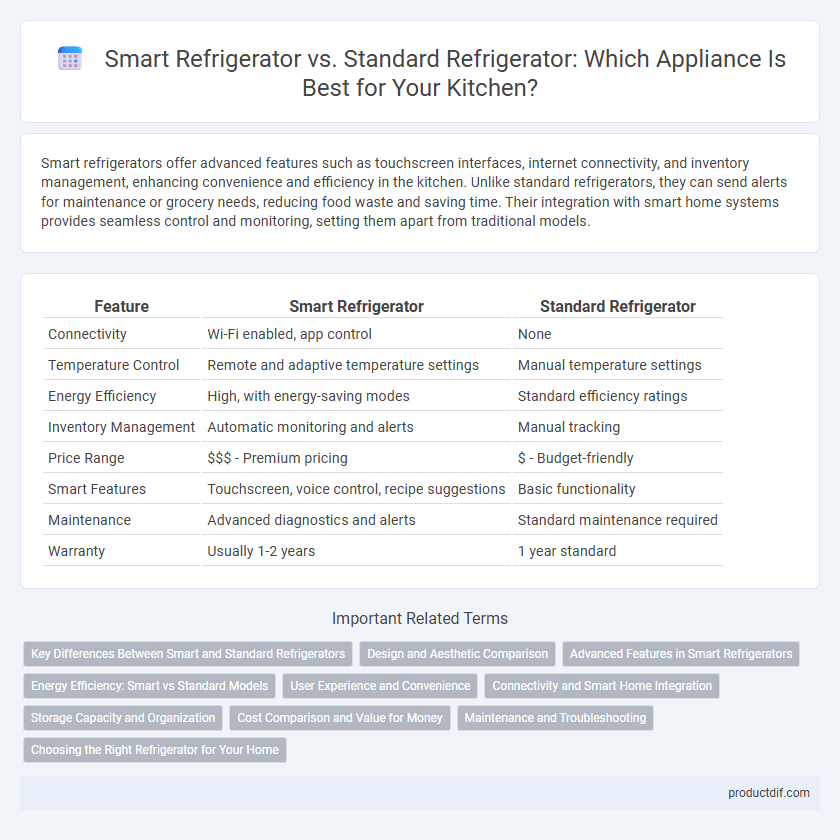Smart refrigerators offer advanced features such as touchscreen interfaces, internet connectivity, and inventory management, enhancing convenience and efficiency in the kitchen. Unlike standard refrigerators, they can send alerts for maintenance or grocery needs, reducing food waste and saving time. Their integration with smart home systems provides seamless control and monitoring, setting them apart from traditional models.
Table of Comparison
| Feature | Smart Refrigerator | Standard Refrigerator |
|---|---|---|
| Connectivity | Wi-Fi enabled, app control | None |
| Temperature Control | Remote and adaptive temperature settings | Manual temperature settings |
| Energy Efficiency | High, with energy-saving modes | Standard efficiency ratings |
| Inventory Management | Automatic monitoring and alerts | Manual tracking |
| Price Range | $$$ - Premium pricing | $ - Budget-friendly |
| Smart Features | Touchscreen, voice control, recipe suggestions | Basic functionality |
| Maintenance | Advanced diagnostics and alerts | Standard maintenance required |
| Warranty | Usually 1-2 years | 1 year standard |
Key Differences Between Smart and Standard Refrigerators
Smart refrigerators feature advanced connectivity options like Wi-Fi and touchscreens, enabling remote monitoring and control via mobile apps, unlike standard refrigerators that lack such integration. They offer smart sensors to optimize temperature and humidity, improving energy efficiency and food preservation, while standard models rely on manual settings without real-time adjustments. Furthermore, smart refrigerators often include features such as inventory tracking, recipe suggestions, and voice assistant compatibility, which are absent in traditional standard refrigerators.
Design and Aesthetic Comparison
Smart refrigerators feature sleek, modern designs with touchscreen interfaces and customizable LED lighting that enhance kitchen aesthetics. Standard refrigerators typically have a traditional design with basic finishes and manual controls, offering a timeless but less dynamic visual appeal. The integration of smart technology allows for a minimalist look that blends seamlessly with contemporary kitchen decor.
Advanced Features in Smart Refrigerators
Smart refrigerators offer advanced features such as touchscreens with internet connectivity, voice control integration, and internal cameras that allow users to monitor contents remotely. These appliances include temperature sensors that optimize cooling for different compartments and inventory management systems that track expiration dates and suggest recipes. Unlike standard refrigerators, smart models provide energy-efficient operation with adaptive settings and seamless integration into smart home ecosystems.
Energy Efficiency: Smart vs Standard Models
Smart refrigerators use advanced sensors and adaptive cooling technology to optimize energy consumption, often reducing electricity usage by 15-30% compared to standard models. Standard refrigerators operate on fixed cooling cycles, leading to higher and less efficient energy use. Energy Star ratings frequently favor smart refrigerators due to their ability to adjust cooling based on usage patterns and ambient conditions.
User Experience and Convenience
Smart refrigerators enhance user experience through features like touchscreens, inventory tracking, and remote temperature control, offering unmatched convenience compared to standard models. Standard refrigerators rely on manual adjustments and lack connectivity, limiting their ability to assist users in meal planning or energy management. The integration of AI and IoT in smart refrigerators significantly streamlines kitchen routines and improves overall household efficiency.
Connectivity and Smart Home Integration
Smart refrigerators offer advanced connectivity features such as Wi-Fi and Bluetooth, enabling seamless integration with smart home ecosystems like Amazon Alexa and Google Assistant. Unlike standard refrigerators, smart models provide real-time inventory tracking, remote temperature control, and automated notifications through mobile apps. This integration enhances convenience and energy efficiency by allowing users to monitor and adjust settings from anywhere.
Storage Capacity and Organization
Smart refrigerators offer enhanced storage capacity with adjustable shelves and customizable compartments, maximizing space efficiency compared to standard refrigerators. Advanced features like humidity-controlled crispers and dedicated zones for different food types improve organization and freshness preservation. These innovations allow users to optimize storage and easily access items, reducing food waste and enhancing kitchen management.
Cost Comparison and Value for Money
Smart refrigerators typically have a higher upfront cost ranging from $1,500 to $3,000 compared to standard models priced between $500 and $1,200. The added features of smart refrigerators, such as touchscreens, Wi-Fi connectivity, and energy-efficient technology, can lead to long-term savings on electricity bills and enhanced food management, offering better value for money. Standard refrigerators may lack these advanced functionalities but offer reliable cooling performance at a lower initial investment, making them suitable for budget-conscious consumers.
Maintenance and Troubleshooting
Smart refrigerators require regular software updates and sensor calibration to prevent connectivity issues, while standard refrigerators primarily need routine cleaning and compressor checks. Troubleshooting smart models often involves resolving app synchronization problems and firmware glitches, whereas standard units typically face mechanical failures like thermostat or fan malfunctions. Maintenance costs for smart refrigerators tend to be higher due to advanced technology components and specialized repair services.
Choosing the Right Refrigerator for Your Home
Smart refrigerators offer advanced features like touchscreen controls, Wi-Fi connectivity, and inventory tracking, making them ideal for tech-savvy households seeking convenience and energy efficiency. Standard refrigerators provide reliable cooling with simpler controls and often lower upfront costs, suitable for those prioritizing budget and straightforward functionality. Evaluating your lifestyle, kitchen space, and energy usage preferences will help determine whether a smart or standard refrigerator best fits your home.
Smart Refrigerator vs Standard Refrigerator Infographic

 productdif.com
productdif.com